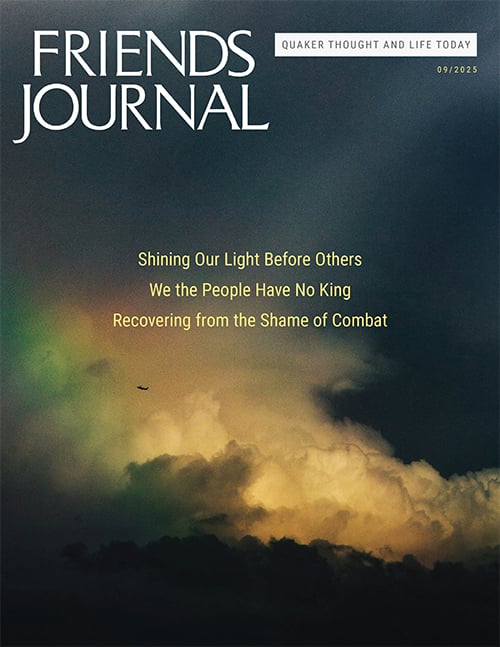The obliviousness of Quaker enslavers
Thank you for these stories of resistance and self-determination in Jim Fussell’s “Black Resistance to Quaker Enslavement” (FJ June-July).
Marcelle Martin
Chester, Pa.
The story in my family is that they moved in the early 1800s, along with others of the Friends community, from North Carolina to Indiana in objection to slavery. Were there movements such as this even though the Friends made their own rules on enslavement 20 years prior?
Kit
Siletz, Ore.
Where documentation exists, I have taken to identifying any ancestors who enslaved human beings. I use an image depicting enslavement as the photo of the individual. One example is Benjamin Cripps of Mannington, Salem Co., West Jersey. The 1758 inventory of his estate includes “2 negroes, 50 pounds.” I feel that acknowledgement of the past can help us to learn from it.
Laurence W Steele
Aurora, Colo.
Jim Fussell’s article forces us to come to grips with a sad part of the past history of Quakers. I would like to point out that even before the era about which Fussell writes, some Friends questioned the morality of owning enslaved people.
Just six years after the founding of the Pennsylvania Colony in 1681 (which later became the state), Friends in Germantown, Pa., questioned the morality of Friends holding enslaved people. Unfortunately, there is no record of what finally became of this concern.
Four men attending a Germantown formative meeting wrote a document questioning the morality of slavery in 1688. They asked the local monthly meeting to judge whether holding enslaved people is consistent with the Golden Rule. The concern was passed on to the monthly meeting, then the quarterly meeting, and finally to the yearly meeting—all of which refused to judge their concern.
Richard Grossman
Bayfield, Colo.
I think it important to point out that rather than give up slavery, most of the Galloway family left the Society of Friends. Whatever acts of resistance they “suffered,” it was not costly enough to quit slavery. When the yearly meetings began to forbid slaveholding in the 1770s, many other Quaker families followed the discipline and manumitted their enslaved people. I wrote about manumission in Maryland for the Journal of Slavery and Data Preservation arguing that while economic arguments cannot be entirely dismissed, religious conviction was more important. Many Quakers had enormous assets invested in their enslaved property, and if they had cared about recovering those funds, they could have simply sold them. That they didn’t, and remained loyal to the Society and its testimonies, is an important facet of this story!
Sydney Van Morgan
Baltimore, Md.
The horror of the sale bulletin, the overt cruelty and evil it represented, and the obliviousness of the enslavers is just impossible to comprehend. The twist about how we remember the abolitionists when the resisting captives were lost to history is an important one, especially to me, a woman, as so many women were left out of history before the revision of the women’s movement. I will review this compelling essay for my meeting and bring this issue of Friends Journal to them after I read it.
Jo Ann Wright
Mt. Ephraim, N.J.
The author responds: Yes, the emotional impact of Samuel Galloway’s sale notice in The Maryland Gazette in 1760 haunts me too. I’m grateful you felt its weight. I’m especially glad you lifted up how easily the moral courage of those who resisted from within bondage gets buried by inherited narratives. This essay aims to reframe Quaker antislavery history by foregrounding Black resistance, and by seeing Woolman, Benezet, and Lay not as central heroes but as part of a broader moral uprising sparked by enslaved people themselves. Your link to the erasure of women’s voices resonates deeply.
Jim Fussell
Richmond, Ind.
Loving one’s neighbor is the advice
In Tim Gee’s “Love Your Neighbor Is a Call to Action” (Viewpoint, FJ June-July), the question is asked about the parable of the Good Samaritan: who is the neighbor? The answer given is the Samaritan, the one who showed mercy. If this is the answer, then who is it that is loving this neighbor? The beaten man? That doesn’t make sense—he’s unconscious.
We interpret this parable as the Samaritan doing an act of love to someone who is perceived to be an enemy. He is the one doing the loving so therefore the beaten man must be the neighbor. The question that should have been asked of Jesus was: what does it mean to love? Then the story and the answer make sense; to love is to love your enemy, to do good to those who hate you—which is what the Samaritan did.
Something got lost in translation.
John Andrew Gallery
Philadelphia, Pa.
Foreswearing all outward wars
The QuakerSpeak discussion on the peace testimony was particularly valuable for me (“Understanding the Quaker Peace Testimony” ensemble video, QuakerSpeak.com, July). I appreciated the acknowledgement that the peace must begin within. I appreciated the acknowledgement that conflict need not be a road to violence, but instead can be a road to deeper honesty and understanding. I appreciated the recognition that it is valuable to consider the language we use because that language can lead to peaceful outcomes or it can escalate toward violence.
William
This has been such a good example for me of how we need to live the peace testimony every day, not just to foreswear “all outward wars” as the statement to King Charles II said we would.
Miranda Mugford
Norwich, UK
Mending our divisions
Bloomington Friends in Indiana has been looking for ways to overcome dilemmas such as declining numbers for over three years now (“Facing the Future” by Tom Rockwell, FJ June-July online). Our Advancement Committee spent several months phoning everyone on our members and attenders list to ask them how they are and gently ask why they are no longer attending. One predominant factor they identified, based on the feedback we received, is that families with children are opting not to attend because they are so very busy. Part of that is because their children need adult supervision, and there is no space in their lives for peaceful moments of worship. We have made our worship room child-friendly. The effect has been very beautiful. We find the gentle rustles and sighs of children playing while we worship to be soothing. Recently an old-timer attended worship for the first time in a few years. Their playful comment was, “Who are all these people?”
Melanie Hunt
Bloomington, Ind.
I believe Friends need to “return home” and begin to mend the divisions within our own yearly meetings! We have spent generations trying to fix the wounds of the world; perhaps we need to focus our attention on the larger Quaker spiritual community. Friends these days often identify as to what they are not (non this, non that) or what they are against (anti this, anti that). I have to ask: what are you for? There is a distinction! Perhaps it’s time to look at the stone in our own eye.
Derek Polzer
Berkeley Heights, N.J.
If Friends had stayed silent?
In the nineteenth century, the revivalist movement was strongly tied to social reform movements (“Revivalist Friends and the Second Quaker Explosion” by Paul N. Anderson, FJ June-July online). In the United Kingdom, the more evangelical Friends were heavily involved in social reform movements, including abolitionism, prison reform, mental health reform, and animal welfare. They also drew in the working class through revivals and aid to people in working class neighborhoods.
Bill Samuel
Germantown, Md.
I always ask myself what would have happened if George Fox and the first Friends would have stayed in total silence: where would Friends be today?
George Busolo Lukalo
Nairobi, Kenya
Don’t delay joy
Thank you for this lovely and joy-filled witness in courage by Willa Taber (“Identity and Christianity,” QuakerSpeak.com, July). Such an inspiring quest to joy replenishes my own spirit in the loving power of the still, small voice within.
Glenna McKitterick
Boston, Mass.
Thanks to Willa for sharing her story so beautifully and for letting trans people know that they can find a spiritual path that is right for them if they trust their own ability to find the right place for themselves.
Liana Laughlin
Cambridge, Mass.
How wonderful that Willa felt that even at age 70, one should not delay joy. Finding one’s right community is key for supporting all needs throughout our lives. My hope is that in time our culture will grow up to truly be able to embrace everyone for where they are—not as gender discovery, but more as gender affirmation.
Carol Meyer-Niedzwiecki
Vicksburg, Mich.
Stuck on words and terminology
Thanks to Barbara Birch for this wonderful article about rediscovery through the life of Rufus Jones (“A Fine Union of Serenity and Adventure,” FJ Aug.). We spend so much time trying to get others to see the way we see that we miss out on so many different perspectives.
I’m reminded that it is the spirit or nature of what one says that is important, and not how they say it or the words with which they say it (which most likely are not quite there). We miss out on so much when we get stuck up on words, structure, and terminology.
From 1 Corinthians 6: “Everything is permissible for me, but not everything is beneficial. Everything is permissible for me, but I will not be enslaved by anything.”
This life of Rufus Jones reminds me that if we focus more on the process than upon the outcome, we will see with much more clarity, and be on our way of recovering the lost radiance we once had as an unlearned child before we became schooled.
Scott Stephenson
Lake Panasoffkee, Fla.
Correction
Barbara Birch’s “A Fine Union of Serenity and Adventure” (FJ Aug.) misstated the year in which American Friends Service Committee (AFSC) accepted the Nobel Peace Prize along with its British counterpart, Friends Service Council. This took place in 1947. The prize was formally accepted for AFSC by Henry Cadbury, not Rufus Jones.




Comments on Friendsjournal.org may be used in the Forum of the print magazine and may be edited for length and clarity.